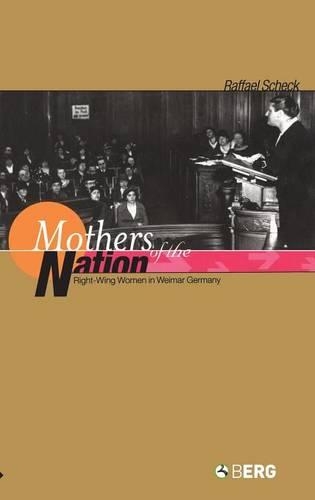
Mothers of the Nation: Right-Wing Women in Weimar Germany
(Hardback)
Available Formats
Publishing Details
Mothers of the Nation: Right-Wing Women in Weimar Germany
By (Author) Raffael Scheck
Bloomsbury Publishing PLC
Berg Publishers
1st September 2010
United Kingdom
Classifications
General
Non Fiction
Cultural studies
European history
320.52082094309042
Physical Properties
Hardback
256
Width 156mm, Height 234mm, Spine 20mm
Description
What role did right-wing women play in the Nazi rise to power Mothers of the Nation analyzes the work of women in the German People's Party and the German National People's Party - parties that covered the range from the moderate to the radical right. Looking at politics on both the local and national level, the author discusses issues ranging from social welfare to foreign policy. He shows that right-wing women, in keeping with the tradition of the German bourgeois women's movement, refused to stand up primarily for women's interests and instead invoked the Volksgemeinschaft (community of the people), a vision of harmony and cooperation of the groups involved in production. These right-wing campaigners believed that German women should use their newly won political rights to strengthen the Volksgemeinschaft by reconciling the divided nation and by infusing it with a higher morality. This stance proved to be both a liability and an asset. The emphasis on the Volksgemeinschaft made it difficult for female conservatives to fight for specific women's rights. Yet it also allowed them to paste over the conflicts between interest groups that tore apart Germany's bourgeois parties prior to 1933 and that divided politically active women as well. The ways in which women sought to contain the fragmentation that ultimately rendered their parties defenceless against the Nazis sheds new light on Weimar politics. Bringing the controversial story of right-wing women to life, this book offers a compelling account of gender and politics during a crucial period in German history.
Reviews
'A significant and valuable contribution, not only to the history of the DNVP and the DVP, but to the social history of politics in the Weimar era in general.'Matthew Stibbe, Lecturer in History, Sheffield Hallam University'In this excellent study, Raffael Scheck explores a series of fateful paradoxes that imperiled Weimar democracy: attachments to household and motherhood propelled women into the public arena; the mobilization of female voters strengthened the nationalist, anti-democratic Right; the effort to imbue middle-class parties with the virtues of the people's community only helped the Nazis; and the campaign to protect Christianity legitimized eugenic legislation. Scheck's great contribution is to trace so well the seams of Germany's political culture between 1918 and 1933.'Peter Fritzsche, author of Reading Berlin 1900 and Germans Into Nazis'Raffael Scheck has brought together many disparate threads of evidence in a closely-argued and entirely coherent thematic study. This book is a thoroughly researched and skilfully executed addition to the growing literature on women in Weimar Germany.' Jill Stephenson, University of Edinburgh'Raffael Scheck enters a new sphere by offering new findings on the local politics of the parties and the activities of women in the DNVP and DVP.'H-Soz-u-Kult 'Raffael Scheck's study of women in the German People's Party (DVP) and the German National People's Part (DNVP) is a welcome addition to the growing body of research into right-wing women in the Weimar Republic, much of which has been written in German and which Scheck brings to English-speaking audiences for the first time.' Helen L.Boack, University of Hertfordshire, in 'German History' journal 'Scheck's well-researched and well-argued study sheds light not only on the activities and beliefs of women in the DNVP and DVP but also on grass-roots politics in the Weimar Repoutlic. It creates a strong foundation for others to research in greater detail women in the DVP, the influence of nationalist and protestant women's groups within the two parties and women's political work at a local level.' Helen L.Boack, University of Hertfordshire, in 'German History' journal
Author Bio
Raffael Scheck Associate Professor and Chair of the History Department, Colby College.
